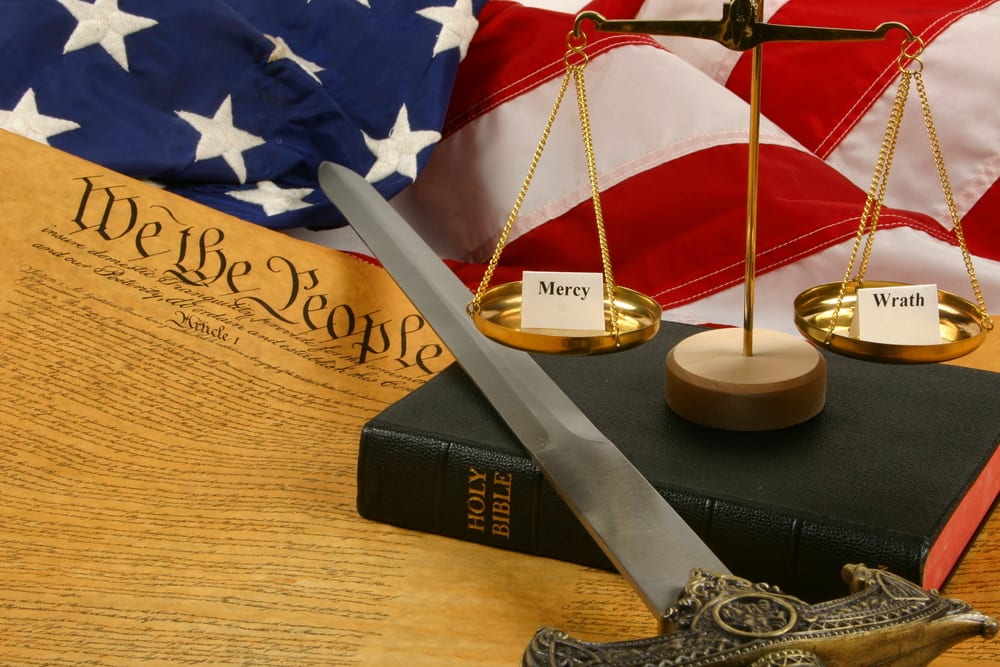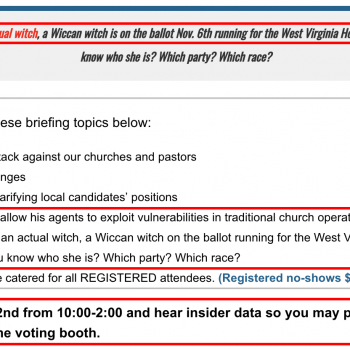This is a guest post by Andrew Seidel. He is an attorney for the Freedom From Religion Foundation and his first book, The Founding Myth: Why Christian Nationalism is Un-American will be released in May.
…

With its new Supreme Court justice, the Religious Right is close to realizing its dream of redefining religious liberty.
Conservative Christians envision a newly minted right, guaranteed under the First Amendment, that believers — really, Christians like them — are exempt from every law, including state and federal civil rights laws, that conflicts with their personal theology. Forget redefining religious freedom. This is weaponizing it.
An individual has the right to believe anything. Full stop. And she can act on those beliefs so long as they don’t impact the rights of others. Freedom of religious belief, or, more generally, the freedom of thought, is absolute. But the right to act on that belief is not. That’s because actions affect other citizens, and once they do, those actions can be regulated by the government.
If people believe their god is commanding them to sacrifice their child — as happens regularly in the Bible — do they have a right to act out their faith? Obviously not. (Human sacrifice may seem like an extreme example, but both Thomas Jefferson and the Supreme Court used it to illustrate the important distinction between the right to believe and the right to act on that belief.)
It may not always be clear where to draw that line regarding religious action the government can and cannot regulate, but the line can always be drawn where the rights of others begin. Your right to swing your religion ends at someone else’s nose. Weaponizing religious freedom would expand the unlimited right to believe into an unlimited right to act.
Right now, the Supreme Court is considering taking two cases that could tip the balance in precisely that disturbing direction.
Less than two weeks ago, an Oregon bakery filed a mulligan of the Masterpiece Cakeshop case, asking for a religious exemption to civil rights laws. They want the ability to refuse service to same-sex couples who want to buy the same kind of wedding cake that a straight couple could purchase. While the Court’s Cakeshop decision was decided on narrow technical grounds, it’s unlikely that the justices could dodge the central question this time around: Does believing that your god condemns homosexuality grant the believer’s business a license to discriminate?
The second case involves a unanimous 7-0 decision in which the New Jersey Supreme Court reaffirmed that taxpayers cannot fund a church’s building renovations via a government grant. Those justices said the government could not oblige Muslims to bankroll temples and yeshivas, or Jews to subsidize Christian churches and Catholic schools, or Christians to fund mosques and madrassas, or nonbelievers to support any faith. Churches in Morris County have now asked the U.S. Supreme Court in Morris County v. Freedom From Religion Foundation to overturn this rule, arguing that they have a religious freedom right to access and use taxpayer funds to build and repair their houses of worship — after all, they suggest, fixing the roof or windows isn’t directly promoting religion. [Full disclosure: I am litigating this case for FFRF and have been since before the lawsuit was filed.]
But if religious liberty is redefined, including granting this license to discriminate, which religions will possess that new right? Will it really be extended to include taxing citizens to build mosques or will it just benefit churches?
Our Constitution does not allow our government to discriminate between religions, so that unlimited license to act would have to be extended to every faith — including Satanism, Islam, Judaism, Raelism, Mormonism, and Scientology. There’s even a good argument that the privilege would extend to nonreligious Americans.
Of course, this assumes that the Supreme Court is even-handed, that it will accord non-Christians and “Nones” the same religious liberty that they accord Christians… which this Court has not. In fact, last term it showed extraordinary favoritism to Christians.
The decision in the Masterpiece Cakeshop case hinged on the Colorado Civil Rights Commission’s supposed hostility toward the bakery’s religion. It was hostility the Court worked hard to manufacture. Days later, the Court refused to apply that same hostility standard to Donald Trump’s travel ban, despite much stronger evidence that he was motivated by anti-Muslim sentiment.
Legally, the cases are inconsistent. The real difference is that one involved a conservative Christian-owned business while the other involved a non-Christian religious minority.
Redefining religious freedom will stratify America further, not along the lines of rich and poor, or believer and nonbeliever, but with Christians — specifically conservative Christians — in a favored class above everyone else.
The Bible may speak of a chosen people, but the Constitution speaks only of “We the People.” The Court must refuse any attempt to create a privileged Christian class by redefining the right to religious freedom protected in our First Amendment. But with Justice* Kavanaugh, we shouldn’t hold our breath.
(Image via Shutterstock)




It’s Moving Day for the Friendly ..."
It’s Moving Day for the Friendly ..."
It’s Moving Day for the Friendly ..."
It’s Moving Day for the Friendly ..."